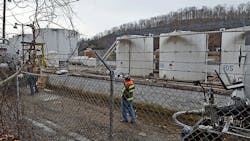TSCA Reform Heads to President Obama for Signature
U.S. Sen. Jim Inhofe (R-Okla.), chairman of the U.S. Senate Environment and Public Works (EPW) Committee, on June 8 praised the final Senate passage of the Frank R. Lautenberg Chemical Safety for the 21st Century Act. The legislation, which includes sweeping reforms to the Toxic Substances Control Act (TSCA), now goes to the president’s desk to be signed into law.
“Congress has taken the final step to send the Lautenberg Act to be signed into law,” said Inhofe. “This historic piece of environmental regulatory reform is a great example of the Republican-led Congress working for the American people by enacting meaningful and commonsense legislation.”
The Lautenberg Act received bipartisan support from industry, manufacturers and several environmentalist groups. TSCA long has been perceived as one of the weakest environmental laws. Supporters claim the new law will create a better framework for regulating chemicals and that it gives the EPA more authority to test and regulate chemicals.
“Passage of this bill demonstrates that we can responsibly achieve regulatory reform, enact sensible environmental laws that protect the health and safety of all Americans, and simultaneously support job creation and economic opportunity here at home,” said Inhofe.
Reaction to Passage of Lautenberg Act Is Swift
Chemical industry associations and manufacturers praised the legislation, with Cal Dooley, president and CEO of the American Chemical Council calling it “truly historic.”
“This legislation is significant not only because it is the first major environmental law passed since 1990, but because TSCA reform will have lasting and meaningful benefits for all American manufacturers, all American families and for our nation's standing as the world’s leading innovator,” said Dooley. “The path to more modern chemical regulation has been decades in the making and it’s been over three years since work to achieve TSCA reform began in earnest. We look forward to the enactment of H.R. 2576 by President Obama in the coming days."
Environmental and consumer advocates admitted concern about provisions in the law that suspend states’ ability to take action while the EPA studies a chemical’s safety. It would grandfather existing state laws and allow states to quickly act to regulate a chemical that EPA might deem a “high priority” chemical, but if a state fails to act quickly, state action would be suspended for up to three years while EPA completes its review.
Carli Jensen, toxics campaign director U.S. PIRG (the Federation Of State Public Interest Research Groups), said in a blog that she is disappointed with the TSCA reform bill because it “preempts state action to regulate a chemical while the EPA is merely assessing its safety – a years-long process that will leave us all at risk. The bill also preempts state laws after the EPA has issued a final regulation, preventing states from enacting additional protections. When it comes to health protections, the federal government should set a floor, not a ceiling.”
In a May 24 blog post, Melanie Benesh, legislative attorney, and Scott Faber, vice president of government affairs, for the Environmental Working Group, acknowledged the legislations contains “some important improvements,” but added it “falls short of adequately protecting Americans from exposure to hazardous chemicals.”
“Is the bill better than current law?” they asked, adding: “It’s a low bar, because TSCA is widely considered the least effective environmental law on the books.”
EHS Today is an IndustryWeek companion site within Penton's Manufacturing & Supply Chain Group.
